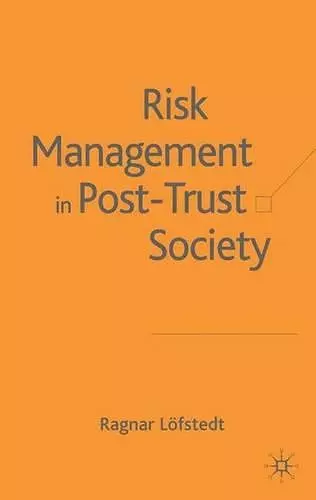Risk Management in Post-Trust Societies
Format:Hardback
Publisher:Palgrave USA
Published:13th May '05
Should be back in stock very soon

Risk communication helps companies, governments and institutions minimise disputes, resolve issues and anticipate problems before they result in an irreversible breakdown in communications. Without good risk communication and good risk management, policy makers have no roadmap to guide them through unforeseen problems, which frequently derails the best policies and results in a breakdown in communications and a loss of trust on behalf of those they are trying hardest to persuade. Most policy makers still use outdated methods - developed at a time before health scares like BSE, genetically modified organisms and dioxin in Belgian chicken feed eroded public confidence in industry and government - to communicate policies and achieve their objectives. Good risk communication is still possible, however. In this book, through the use of a host of case studies from four countries, the author identifies a series of methods that are set to work in a post trust society.
'Risk Management in Post-Trust Societies highlights the difficult balancing task facing risk regulators. Regulatory inaction against real risks can undermine public trust. However, exaggerated responses to risks can also jeopardize regulators' credibility. The diverse international case studies developed by Ragnar Lofstedt provide guidance for how regulators can navigate these and other frequently competing concerns.' - W. Kip Viscusi, Cogan Professor of Law and Economics, Harvard University, USA
'In democracies, government policies cannot succeed without public acceptance. Yet complex risk management requires technical expertise. How to reconcile these competing needs? Ragnar Lofstedt provocatively challenges recent research claiming that risk managers must engender public trust via deliberative dialogue. He uses four case studies to argue that the reasons for distrust vary and demand different responses; that in some cases trust can flow from technical competence without public deliberation; and that in others public deliberation can actually aggravate distrust. Trust me: Lofstedt's book will add spice to the debate over risk, experts, the public, and trust.' - Jonathan B. Wiener, Perkins Professor of Law and Environmental Policy, Duke University, USA
'Professor Ragnar Löfstedt has once again produced a most interesting book on risk management and trust, well-based in theory and build on empirical findings. Löfstedt presents a number of importantand thought-provoking conclusions on how to integrate trust into risk management, conclusions that once implemented might not only contribute to restored trust in society, but also to decreased risk.' - Mikael Karlsson, President, Swedish Society for Nature Conservation
'This is a thought provoking and invaluable book for anyone who cares about risk communication and management in the 21st century. Professor Löfstedt, via a number of case studies and the latest theoretical analysis, offers new insights on how regulators and policy makers can best win back the public's trust in the era of post trust.' - Anna Jung, Director General, European Food Information Council
'Ragnar Löfstedt's book is about the need to re-establish public trust in policy making for our modern societies. Understanding and communicating risk is essential for politicians and regulators in Europe and worldwide. In an increasingly diverse and interrelated world, a sophisticated risk management system will be the essential tool to re-establish trust. Professor Löfstedt's deep and profound scientific knowledge and his political insight into the various cases will help us to develop more appropriate risk management strategies.' - Erika Mann MEP, Germany
ISBN: 9781403949783
Dimensions: unknown
Weight: unknown
165 pages